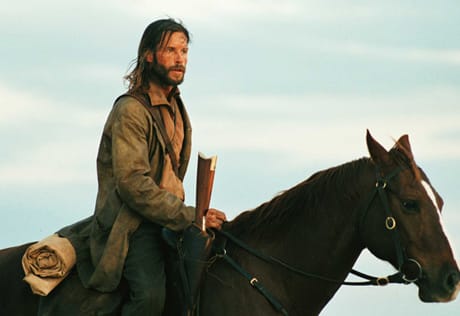Sharing an abundance of signifiers with the American inception ― having developed from a process of (primarily) European emigration and displacement of indigenous peoples, leading to conflict and the rebuilding of a culture ― it is logical to deconstruct, or re-evaluate, the Western mythology using the framework of Australia. Of distinction is the tone and perspective of this genre twist, since writer Nick Cave and director John Hillcoat constructed the intense and thought-provoking existential morality parable, The Proposition, knowing the differences between the two countries. Chiefly, where America was built upon optimism and idealism, with people wilfully escaping their lives to build a new nation based upon hope and change, Australia was developed from penal colonies, with varying criminals dumped there against their will. This shift in outlook and foundation defines the introspective and metaphysical tone of Hillcoat's masterpiece of human contradiction. The set-up is simple enough: this tale of Christian compounding vengeance starts with idealistic British lawman Captain Stanley (Ray Winstone) sending the Irish Charlie Burns (Guy Pearce) on a mission to kill his brother, Arthur (Danny Huston), to save his younger sibling, Mike (Richard Wilson). Since the trio was charged with slaughtering a family, including a pregnant woman, the local Australian townsfolk are none too pleased with Stanley's lack of swift, vengeful action, nor is his wife, Martha (Emily Watson). As these two storylines unfold, with Nick Cave's non-traditional score heightening the Western twist and contemplative theme of this tale, the nature of everyone's internal moral lexicon and their varying shades of grey are revealed and complicated by the wide array of ideologies. Whether questioning the nature of God and justice as a mode of simplifying moral righteousness and sating rudimentary annihilation anxiety or questioning a constantly shifting sense of values when that ideological framework is diminished, the vast desert outback heightens that sense of existential woe with acute visual aplomb. Similarly, Hillcoat's crisp, blunt, albeit contemplative vision mixes the harshness of sudden violence with the sombreness of inner-analysis. Moments of intense graphic violence ― Charlie being speared and the head of an aboriginal being blown in half ― are shocking and unembellished, but Hillcoat's decision to juxtapose these bleak sequences with moments of compounding human baggage and introspection heightens only the complexity of the human experience. Never once does the harsh, realist depiction of Australian in the late 1800s seem gratuitous or thoughtless. Every action has an inevitable consequence, as the circle of vengeance escalates. With a rich thematic texture and stunning composition, there's an endless array of concepts and notions to contemplate and discuss, which is why the subtle nature of the half-hour "Making of" supplement included with the Blu-Ray is ideal in its existing format. Hillcoat, Cave and the wide cast of characters discuss broad themes and character motivations without spelling everything out. Similarly, the commentary track is infrequent and peppered mostly with anecdotal information and discussions about things like set design, noting that Europeans routinely try to surround themselves with reminders of home (planting greenery in the desert). As a timeless work of uncompromising candour, The Proposition should be considered essential viewing for anyone keen on genre deconstruction and the nature of cultural mythologies.
(Alliance)The Proposition [Blu-Ray]
John Hillcoat

BY Robert BellPublished Oct 4, 2012